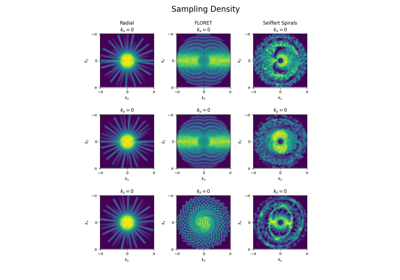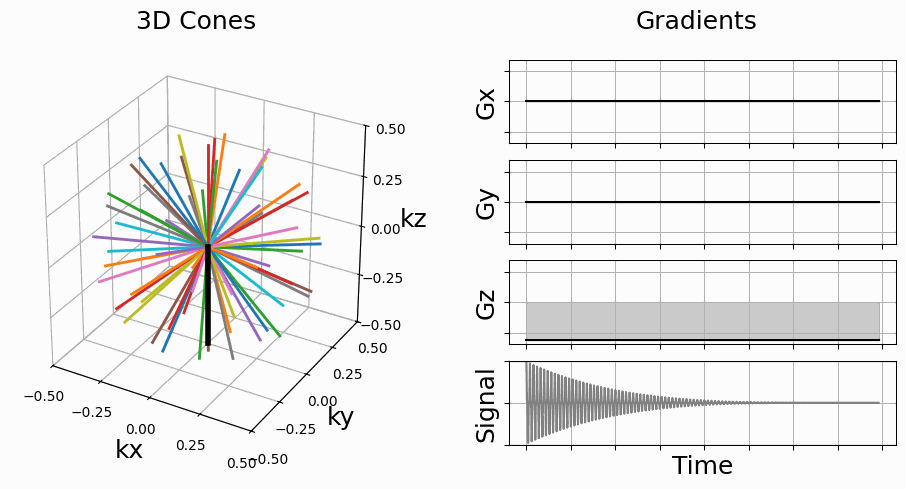initialize_3D_seiffert_spiral#
- mrinufft.trajectories.trajectory3D.initialize_3D_seiffert_spiral(Nc: int, Ns: int, curve_index: float = 0.2, nb_revolutions: float = 1, axis_tilt: str | float = 'golden', spiral_tilt: str | float = 'golden', in_out: bool = False) ndarray[tuple[int, ...], dtype[_ScalarType_co]][source]#
Initialize 3D trajectories with modulated Seiffert spirals.
Initially introduced in [SMR18], but also proposed later as “Yarnball” in [SB21] as a nod to [IN95]. The implementation is based on work from [Er00] and [Br09], using Jacobi elliptic functions rather than auxiliary theta functions.
- Parameters:
Nc (int) – Number of shots
Ns (int) – Number of samples per shot
curve_index (float) – Index controlling curve from 0 (flat) to 1 (curvy), by default 0.3
nb_revolutions (float) – Number of revolutions, i.e. times the polar angle of the curves passes through 0, by default 1
axis_tilt (str, float, optional) – Angle between shots over a precession around the z-axis, by default “golden”
spiral_tilt (str, float, optional) – Angle of the spiral within its own axis defined from center to its outermost point, by default “golden”
in_out (bool) – Whether the curves are going in-and-out or start from the center, by default False
- Returns:
3D Seiffert spiral trajectory
- Return type:
NDArray
References
[IN95]Irarrazabal, Pablo, and Dwight G. Nishimura. “Fast three dimensional magnetic resonance imaging.” Magnetic Resonance in Medicine 33, no. 5 (1995): 656-662.
[Er00]Erdös, Paul. “Spiraling the earth with C. G. J. jacobi.” American Journal of Physics 68, no. 10 (2000): 888-895.
[Br09]Brizard, Alain J. “A primer on elliptic functions with applications in classical mechanics.” European journal of physics 30, no. 4 (2009): 729.
[SMR18]Speidel, Tobias, Patrick Metze, and Volker Rasche. “Efficient 3D Low-Discrepancy k-Space Sampling Using Highly Adaptable Seiffert Spirals.” IEEE Transactions on Medical Imaging 38, no. 8 (2018): 1833-1840.
[SB21]Stobbe, Robert W., and Christian Beaulieu. “Three‐dimensional Yarnball k‐space acquisition for accelerated MRI.” Magnetic Resonance in Medicine 85, no. 4 (2021): 1840-1854.


